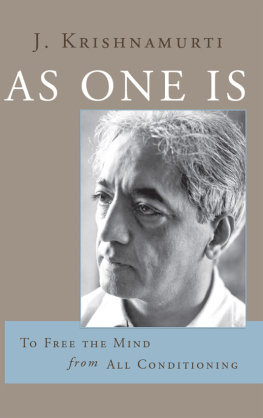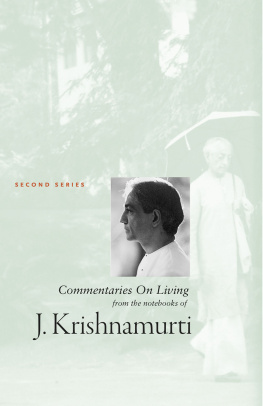Krishnamurti - Commentaries on Living: First Series
Here you can read online Krishnamurti - Commentaries on Living: First Series full text of the book (entire story) in english for free. Download pdf and epub, get meaning, cover and reviews about this ebook. publisher: Quest Books, genre: Religion. Description of the work, (preface) as well as reviews are available. Best literature library LitArk.com created for fans of good reading and offers a wide selection of genres:
Romance novel
Science fiction
Adventure
Detective
Science
History
Home and family
Prose
Art
Politics
Computer
Non-fiction
Religion
Business
Children
Humor
Choose a favorite category and find really read worthwhile books. Enjoy immersion in the world of imagination, feel the emotions of the characters or learn something new for yourself, make an fascinating discovery.

- Book:Commentaries on Living: First Series
- Author:
- Publisher:Quest Books
- Genre:
- Rating:4 / 5
- Favourites:Add to favourites
- Your mark:
- 80
- 1
- 2
- 3
- 4
- 5
Commentaries on Living: First Series: summary, description and annotation
We offer to read an annotation, description, summary or preface (depends on what the author of the book "Commentaries on Living: First Series" wrote himself). If you haven't found the necessary information about the book — write in the comments, we will try to find it.
Commentaries on Living: First Series — read online for free the complete book (whole text) full work
Below is the text of the book, divided by pages. System saving the place of the last page read, allows you to conveniently read the book "Commentaries on Living: First Series" online for free, without having to search again every time where you left off. Put a bookmark, and you can go to the page where you finished reading at any time.
Font size:
Interval:
Bookmark:
Commentaries on Living: First Series
Copyright 1956, by Krishnamurti Foundation of America
Commentaries
on Living
First Series
From the Notebooks of
J. Krishnamurti
Edited by
D. RAJAGOPAL
T ABLE OF C ONTENTS
T HREE P IOUS E GOISTS
The other day three pious egoists came to see me. The first was a sannyasi, a man who had renounced the world; the second was an orientalist and a great believer in brotherhood; and the third was a confirmed worker for a marvellous Utopia. Each of the three was strenuous in his own work and looked down on the others attitudes and activities, and each was strengthened by his own conviction. Each was ardently attached to his particular form of belief, and all were in a strange way ruthless.
They told me, especially the Utopian, that they were ready to deny or sacrifice themselves and their friends for what they believed. They appeared meek and gentle, particularly the man of brotherhood, but there was a hardness of heart and that peculiar intolerance which is characteristic of the superior. They were the chosen, the interpreters; they knew and were certain.
The sannyasi said, in the course of a serious talk, that he was preparing himself for his next life. This life, he declared, had very little to offer him, for he had seen through all the illusions of worldliness and had forsaken worldly ways. He had some personal weaknesses and certain difficulties in concentration, he added, but in his next life he would be the ideal which he had set for himself.
His whole interest and vitality lay in his conviction that he was to be something in his next life. We talked at some length, and his emphasis was always on the tomorrow, on the future. The past existed, he said, but always in relation to the future; the present was merely a passage to the future, and today was interesting only because of tomorrow. If there were no tomorrow, he asked, then why make an effort? One might just as well vegetate or be like the pacific cow.
The whole of life was one continuous movement from the past through the momentary present to the future. We should use the present, he said, to be something in the future: to be wise, to be strong, to be compassionate. Both the present and the future were transient, but tomorrow ripened the fruit. He insisted that today is but a stepping-stone, and that we should not be too anxious or too particular about it; we should keep clear the ideal of tomorrow and make the journey successfully. Altogether, he was impatient of the present.
The man of brotherhood was more learned, and his language more poetic; he was expert in handling words, and was altogether suave and convincing. He too had carved a divine niche for himself in the future. He was to be something. This idea filled his heart, and he had gathered his disciples for that future. Death, he said, was a beautiful thing, for it brought one nearer to that divine niche which was making it possible for him to live in this sorrowful and ugly world.
He was all for changing and beautifying the world, and was working ardently for the brotherhood of man. He considered that ambition, with its attendant cruelties and corruption, was inevitable in a world where you had to get things done; and unfortunately, if you wanted certain organizational activities carried on, you had to be a little bit on the hard side. The work was important because it was helping mankind, and anyone who opposed it had to be put asidegently, of course. The organization for that work was of the utmost value and must not be hindered. Others have their paths, he said, but ours is essential, and anyone who interferes is not one of us.
The Utopian was a strange mixture of the idealist and the practical man. His Bible was not the old but the new. He believed in the new implicitly. He knew the outcome of the future, for the new book foretold what it was to be. His plan was to confuse, organize and carry out. The present, he said, was corrupt, it must be destroyed, and out of this destruction the new would be built. The present was to be sacrificed for the future. The future man was all-important, not the present man.
We know how to create that future man, he said, we can shape his mind and heart; but we must get into power to do any good. We will sacrifice ourselves and others to bring about a new state. Anyone who stands in the way we will kill, for the means is of no consequence; the end justifies any means.
For ultimate peace, any form of violence could be used; for ultimate individual freedom, tyranny in the present was inevitable. When we have the power in our hands, he declared, we will use every form of compulsion to bring about a new world without class distinctions, without priests. From our central thesis we will never move; we are fixed there, but our strategy and tactics will vary depending upon changing circumstances. We plan, organize and act to destroy the present man for the future man.
The sannyasi, the man of brotherhood and the Utopian all live for tomorrow, for the future. They are not ambitious in the worldly sense, they do not want high honours, wealth or recognition; but they are ambitious in a much more subtle way. The Utopian has identified himself with a group which he thinks will have the power to reorient the world; the man of brotherhood aspires to be exalted, and the sannyasi to attain his goal. All are consumed with their own becoming, with their own achievement and expansion. They do not see that this desire denies peace, brotherhood and supreme happiness.
Ambition in any formfor the group, for individual salvation, or for spiritual achievementis action postponed. Desire is ever of the future; the desire to become is inaction in the present. The now has greater significance than the tomorrow. In the now is all time, and to understand the now is to be free of time. Becoming is the continuation of time, of sorrow. Becoming does not contain being. Being is always in the present, and being is the highest form of transformation. Becoming is merely modified continuity, and there is radical transformation only in the present, in being.
I DENTIFICATION
Why do you identify yourself with another, with a group, with a country? Why do you call yourself a Christian, a Hindu, a Buddhist, or why do you belong to one of the innumerable sects? Religiously and politically one identifies oneself with this or with that group through tradition or habit, through impulse, prejudice, imitation and laziness. This identification puts an end to all creative understanding, and then one becomes a mere tool in the hands of the party boss, the priest or the favoured leader.
The other day someone said that he was a Krishnamurti-ite, whereas so-and-so belonged to another group. As he was saying it, he was utterly unconscious of the implications of this identification. He was not by any means a foolish person; he was well read, cultured and all the rest of it. Nor was he sentimental or emotional over the matter; on the contrary, he was clear and definite.
Why had he become a Krishnamurti-ite? He had followed others, belonged to many wearisome groups and organizations, and at last found himself identified with this particular person. From what he said, it appeared that the journey was over. He had taken a stand and that was the end of the matter; he had chosen, and nothing could shake him. He would now comfortably settle down and follow eagerly all that had been said and was going to be said.
When we identify ourselves with another, is that an indication of love? Does identification imply experimentation? Does not identification put an end to love and to experiment? Identification, surely, is possession, the assertion of ownership; and ownership denies love, does it not? To own is to be secure; possession is defence, making oneself invulnerable. In identification there is resistance, whether gross or subtle; and is love a form of self-protective resistance? Is there love when there is defence?
Next pageFont size:
Interval:
Bookmark:
Similar books «Commentaries on Living: First Series»
Look at similar books to Commentaries on Living: First Series. We have selected literature similar in name and meaning in the hope of providing readers with more options to find new, interesting, not yet read works.
Discussion, reviews of the book Commentaries on Living: First Series and just readers' own opinions. Leave your comments, write what you think about the work, its meaning or the main characters. Specify what exactly you liked and what you didn't like, and why you think so.









